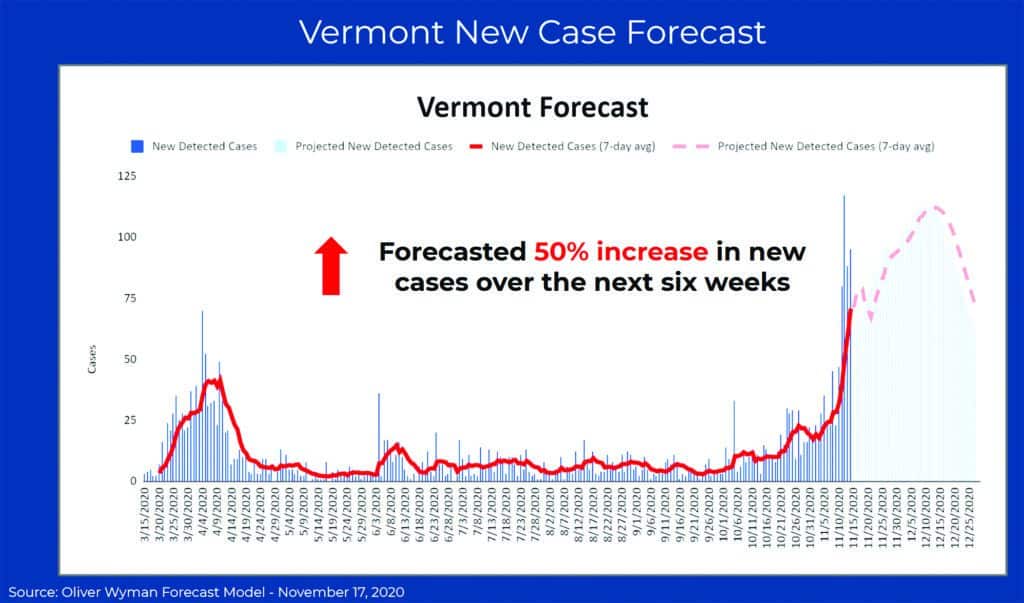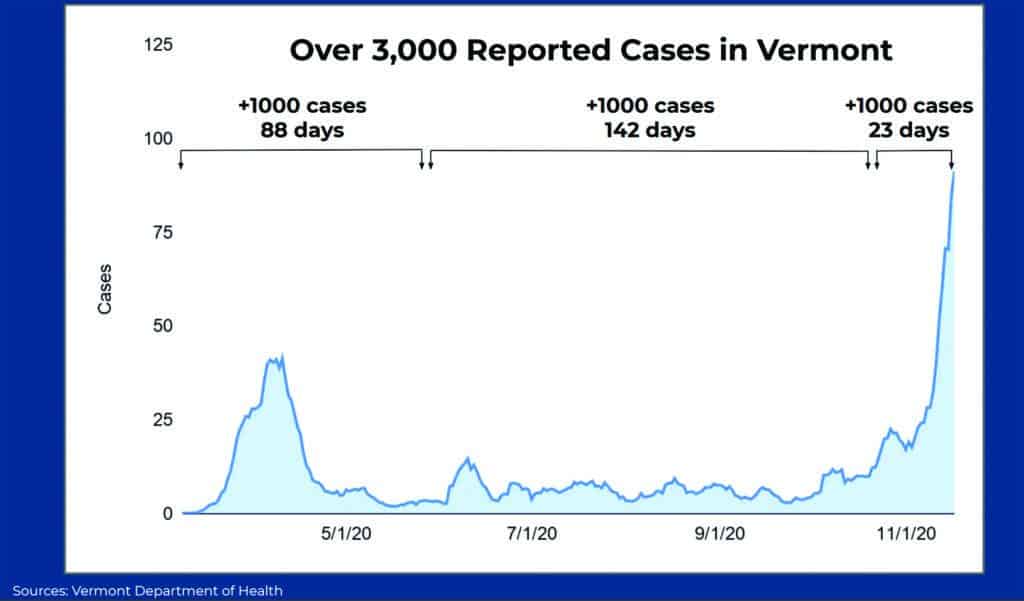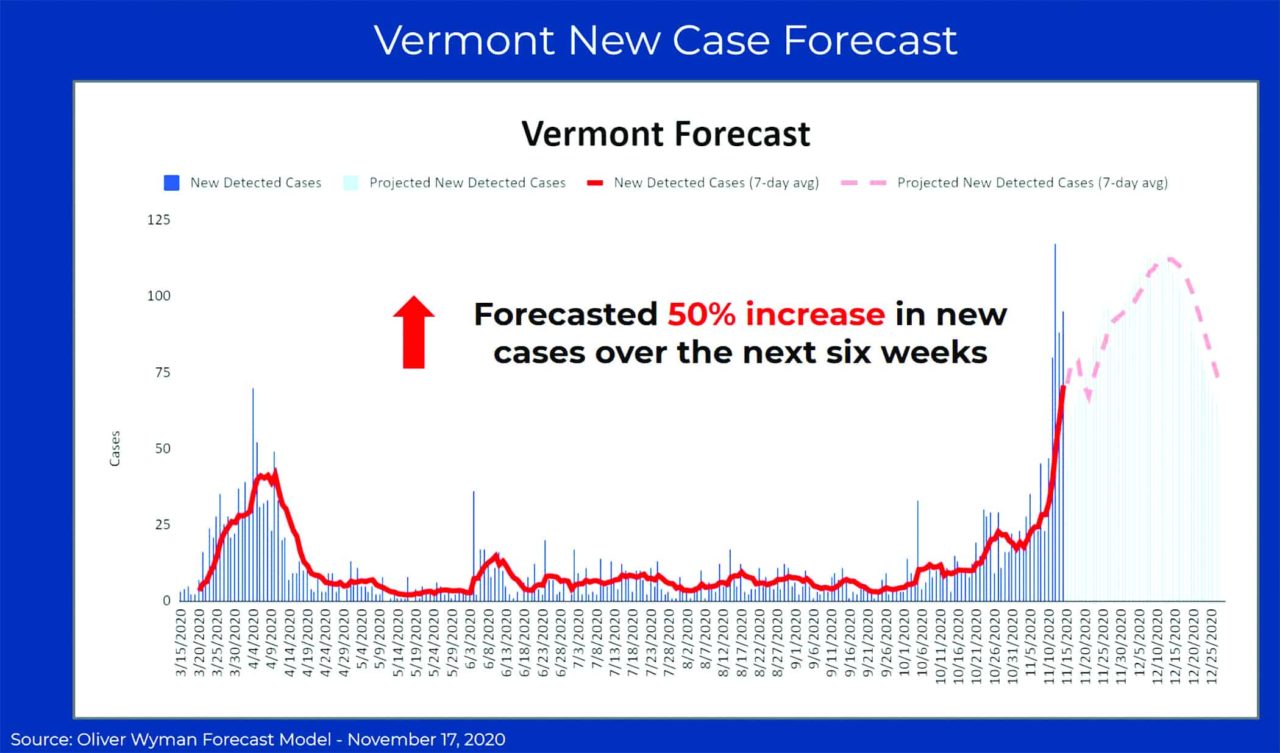
Contact tracer keeps advice simple: stay 6 feet apart or keep contact to less than 15 minutes
By Polly Mikula
The recent surge of Covid-19 case growth in Vermont has led to new mitigation measures to slow the spread. Among those announced Friday, Nov. 13, were a prohibition on multi-family gatherings and the closure of bars/social clubs and recreational sports (youth and adult.) Additionally, restaurants must close in-person dining at 10 p.m. and only seat one household per table, telework should be reimplemented to the maximum extent possible and in-person meetings of all kinds are “strongly discouraged.”
“We’ve had tremendous success thanks to the hard work of Vermonters, but we are at a pivotal moment,” said Governor Phil Scott, Friday. “We have an opportunity right now to get our arms around this record growth and return to the case stability we’ve grown accustomed to, but we all have to step up and recommit to following all current health guidance and to limit our contacts as much as possible.”
“These steps address the areas that our contact tracing team tells us are driving the recent case growth,” Scott explained further at the press conference Tuesday, Nov. 17. “They found it’s mostly adults from multiple households getting together with friends inside and outside and it usually involves alcohol and food —with little, if any, mask-wearing… Gatherings like Halloween parties and beers with friends after games has led directly to our records growth.”
On Monday, Vermont broke another record reporting 123 new Covid-19 cases in a day. The prior record was 117 reported earlier that week on Nov. 12.
“I’d like to take a minute to address questions and concerns from people who believe there is inconsistency with our approach — from people who would prefer we shut down restaurants or close schools or close contact businesses like gyms and salons, but not restrict private social gatherings,” Scott continued, Tuesday. “Let’s talk about consistency: The steps we took were based on data from the contact tracers because from the beginning we have consistently used facts based in science to make our decisions.
“I understand it may seem counter-intuitive that restaurants remain open and yet you can’t have neighbors over for dinner. But the fact is from Oct. 1 to the time of Friday’s announcement, 71% of cases were linked to social events with people gathering at homes or at bars and clubs. We’re just not seeing these types of outbreaks linked back to people dining at restaurants or working out at gyms. This tells us the protocols at those businesses are, for the most part, working. We have had a number of cases at schools, but we have had very few schools that have experienced transmission from one person to another, which means schools are not driving this either.
“This brings me to the next point: we’re in the environment where we’ve got to prioritize need over want. In-person education, protecting our healthcare system and keeping people working as long as we can do it safely, are the things we need. By comparison, cookouts or hanging out with people socially, while it may be fun, it’s not a need — they put a lot of people at risk.”

Scott: Skeptics, please join the fight
As he did Friday, Scott once again addressed skeptics on Tuesday. To those who may not support or follow the state’s recommendations, Scott said:
“Make no mistake I understand that if you want to ignore the science, to choose not to believe it, there’s not much we can do to stop you,” he began. “But I want to be clear: the number of people in hospitals is growing across the country because some care more about what they want to do rather than what they need to do to help protect others, keep kids in the school, keep people working, and prevent the healthcare system from being overwhelmed to the point where care is being delivered in makeshift hospitals.
“It’s a fact that the consequences of an overwhelmed healthcare system will have a far greater impact on the economy and welfare than all the prevention and mitigation measures in place across the country.
“So again it’s right that they can do what they want, but please don’t call it patriotic. Don’t pretend it’s about freedom because real Patriots serve and sacrifice for all whether they agree with them or not. Patriots also stand up and fight when our nation’s health and security is threatened and right now our country and way of life is being attacked by this virus, not the protections we put in place.”
“I understand getting together with family especially during the holidays is important and I understand how hard it is to be asked to keep making sacrifices. As I said last week, I haven’t seen my mom or my daughter and nearly a year. Right now we’re in the middle of a pandemic and we’re seeing record growth. And it is not because of tourists or because of restaurants or gyms, or schools. It’s because adults continue to get together with other adults, multiple households inside and outside in situations usually involving alcohol where they stop taking precautions. And then they go to work or school…”
“I hear the anger out here, I hear the frustration, anxiety and the sadness. I get it. So if you need to take it out on someone send it my way. I can take it, but I can’t take the virus continuing to grow because it’s putting our healthcare system our economy and many lives at risk… I’m asking you to please do your part.”
Frustration and hope
Scott acknowledged a range of frustrations on Tuesday, empathizing with many Vermonters and also sharing his own frustrations and sacrifices.
“I know this is incredibly difficult and frustrating especially with the holidays right around the corner,” he said. “But it’s necessary and we need Vermonters help to get this back under control.”
“I’m angry with the virus, I’m frustrated with those that don’t believe that we can mitigate this, because we did it before and we can do it again… the frustrating thing is we did things better [than the rest of the country], and we can do it again if we all pull in the same direction for just a little bit longer. We can see the finish line ahead of us!
“I think of this kinda like Stock Car racing,” Scott continued. “We have about five laps to go and we need to be running those laps as well as we did our first five laps… It’s not time to let off the gas right now. We can win this but it’s going to take all of us, the whole team, the whole crew … I’m confident we can, we just need some cooperation… We have what it takes to over come this, we just need to step up.”
Charting the growth
On Tuesday, Commissioner of Financial Regulation Michael S. Pieciak, presented an update charting the spread of the virus in Vermont, regionally and nationally.
“I want to mention that there won’t be a lot of positive or optimistic news necessarily in this presentation,” he began. “However, as the governor said, and I’d like to reiterate, the future is not inevitable for us, it is truly in our hands. And our actions today or our actions tomorrow will determine what our future, in fact, looks like and how safe we keep ourselves and our communities.”
This past week, the United States added an additional 1 million cases. “This is the fastest the United States has ever added 1 million cases — within 6 days — that’s a pretty astonishing number and the rate at which it’s growing is rather astonishing as well,” Pieciak said.
Unlike some of the previous spikes around the country, this time Vermont is not immune. “As you can see from the chart, it took us about 88 days our reach our first 1,000 cases, it took about a 142 to report our next 1,000 and only 23 days to reach the most recent 1,000 cases. You can clearly see why the governor’s mitigation measures were necessary step last Friday,” he said.
Nationally, experts are forecasting a 71% increase in cases over the next 6 weeks topping out at about 250,000 per day on average. Regionally, experts are forecasting a 153% growth for Northeast. The forecast for Vermont is somewhat better with a 50% increase predicted over the next six weeks, with case numbers averaging around 100 per day at the peak in mid-December.
“We anticipate that we will start to see cases slow down and start to decrease because of the intervention measures that were put into place now,” Pieciak said.
While all travel to Vermont has been suspended without quarantine, Pieciak noted that areas above the state’s threshold of 400 cases per million or higher were not limited to areas outside Vermont. Washington and Orange County rank pretty high, he noted, even when compared to places like Ohio, Pennsylvania, Connecticut, Rhode Island and Massachusetts. Those two counties account for nearly 40% of the Covid-19 cases in the state over the last two weeks, Vermont Health Commissioner Dr. Mark Levine said.
More testing, Rutland site to open
The state will be expanding testing and contact tracing protocols to be better positioned to “hunt this virus down and stop it in its tracks,” Scott said Friday.
“Even though Vermont already does more testing per capita than any other state our goal is to make testing more available and convenient for everyone,” Scott added Tuesday.
This week, five testing sites will be opened in Burlington, Middlebury, Waterbury, Rutland and Brattleboro. They will operate seven days a week. Once opened, 2/3 of Vermonters will be within a 30 minute drive of a testing site, Scott said.
Secretary of the Agency of Human Services Mike Smith added that the state plans to have 14 sites open by the end of the month. Once that happens, the state will be able to conduct 30,000 tests per week, or about 5,000 tests per day, he said.
“Unlike early programs, these sites will offer hours that are convenient to Vermonters,” Smith said, “including evening hours and will be open seven days a week.”
This past week, the state began offering testing for all teachers and school staff. About 1,700 have since been tested — a program that will continue with a rotational schedule such that all teachers in the state will be able to be tested each month.
Advice from a contact tracer
“The most important thing I’ve learned about this virus is that it will take advantage of us but only if we give it the chance,” said Levine. “So we’re asking for Vermonters to give up spending time with friends and family outside of their own households. It is not easy, but based on what we’ve seen driving transmission, this is necessary.
“I know we can change our behaviors, and we have time to make a difference, to keep our schools open, to keep people working and to protect our healthcare system and, most importantly, saved lives,” Levine echoed.
Levine shared a hypothetical story illustrating just how easily a seemingly harmless social gathering could lead to cascading numbers of cases and outbreaks at the press conference, Friday. On Tuesday, he shared a story from a different perspective: that of a contact tracer.
With permission, Levine read a Facebook post from Monica Ogelby, the state health department’s clinical services director with the office of children with special health needs. She now leads the contact tracing clinical team.
While she’s not usually big on social media, the recent record-breaking outbreaks have “lit a fire” in her, Levine said. “What she writes, it’s really quite simple,” he said, then read her post, which follows:
“It’s really quite simple.
“The definition of a close contact in the contact tracing world is within 6 feet for greater than 15 minutes. So if you don’t want to get named as a contact and have to quarantine, don’t be within 6 feet for greater than 15 minutes of anyone you don’t need to be. If you don’t want to get Covid-19, don’t be within 6 feet for greater than 15 minutes of anyone you don’t need to be. If you don’t want me to call you and ask you where you’ve been every second of the day for the last week, we can make that call very short if you’ve not been within 6 feet for greater than 15 minutes of anyone you didn’t need to be.
“Some people need to be in close contact with others: they’re called healthcare providers and teachers. Because those are the services and supports our society needs to get through this.
“We don’t need bars. We might want bars, but we don’t NEED them. We don’t need parties or deer camp or in-person gatherings of any kind. We might want them, but we don’t NEED them. Not the way we NEED our healthcare system to stay afloat or our children to have access to an equitable education.
“Since March 9 I’ve been yanked from my day job, weekends, holidays and family to be a clinical lead for Vermont’s contact tracing team. I don’t need thanks or accolades, I’m part of a team of many.
“What I NEED is for you to stay away from people you don’t have to be in close contact with. “Wherever you are, whatever you’re doing, ask yourself:
“Am I within 6 feet for greater than 15 minutes of anyone?
“If the answer is no, you’re doing it right. If the answer is yes, then that contact better be a household member, a healthcare provider or a teacher. Because otherwise, it’s an unnecessary contact and that that’s how Covid has spread like wildfire.”
What’s next?
While the recent mitigation measures are all listed as “temporary limitations,” neither Scott, Levine, Smith nor Pieciak gave any indication that they’d be relaxed soon.
“Once we get back to where we were, we can safely roll back these latest restrictions while we wait for the vaccine,” Scott said. He would not quantify exactly what number would trigger a reversal, however.
Scott added that more specifics on the current restriction would be announced at this coming Friday’s press conference, Nov. 20. “I will be providing more clarity on social gatherings based on questions we’ve gotten to help folks understand what we need from them,” he said.




